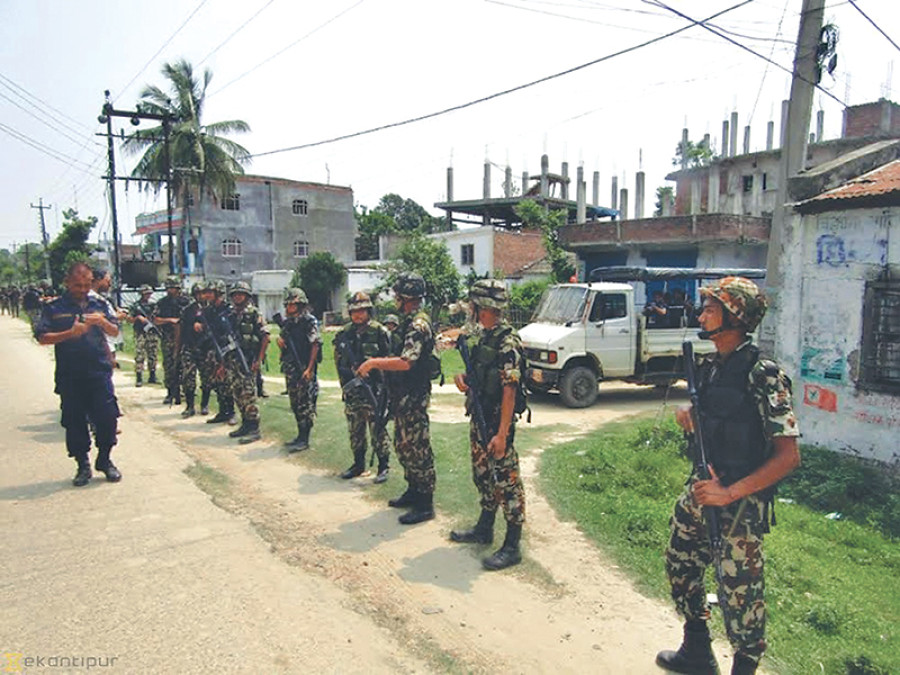Opinion
All’s well, soldier
The second phase of local elections has been completed in Provinces 1, 5 and 7. The voter turnout rate was massive in most constituencies.
Randhir Chaudhary
The second phase of local elections has been completed in Provinces 1, 5 and 7. The voter turnout rate was massive in most constituencies. At the same time, voters in three rural municipalities in Nawalparasi district boycotted the polls en masse in protest against holding the election before grievances of the Madhesis against the constitution were addressed. One entire village in Solukhumbu district too rejected the election saying that the state did not design the constituencies in a pragmatic way.
Meanwhile, the state has also taken an unconstitutional step during the second phase of local elections. This has been criticised by a large section of the population. The unconstitutional step was the deployment of the Nepal Army. Even the commissioner of the National Human Rights Commission (NHRC) said in an interview that the state should not deploy troops to maintain a peaceful environment. The sight of soldiers terrorised voters in both rural and urban areas. Mahantha Thakur, the president of the Rastriya Janata Party-Nepal (RJP-N), has officially objected to the decision to deploy the Army during the election. A question arises: Why has there been criticism from so many quarters?
Constitutional conditions
When the RJP-N announced before the election that it would launch a protest, chances of a confrontation had grown, mostly in Rupandehi and Nawalparasi districts. But when two prominent leaders Brijesh Kumar Gupta and Sarbendra Nath Sukla agreed to join the election, the possibility of a confrontation diminished. Likewise, in the eastern Tarai districts of Morang and Sunsari, there was no possibility of any kind of trouble because two major Madhes-based parties, the Sanghiya Samajwadi Forum Nepal and Nepal Loktantrik Forum, had joined the election. In Jhapa, none of the Madhes-based parties had any dominance.
In such a political scenario, it was not necessary to deploy the Army. The state even breached the constitution by bringing out the troops. None of the conditions in the constitution under which the Army can be deployed was fulfilled. This move was not only unconstitutional, but also dangerous in a democracy. Article 267 (6) of the constitution states: ‘’The President shall, on the recommendation of the National Security Council and pursuant to a decision of the Government of Nepal, Council of Ministers, declare the mobilisation of the Nepal Army in cases where a grave emergency arises in regard to the sovereignty or territorial integrity of Nepal or the security of any part thereof, by war, external aggression, armed rebellion or extreme economic disarray. A declaration of the mobilisation of the Nepal Army must be ratified by the House of Representatives within one month after the date of such declaration.’’
Is it reasonable to argue that Nepal was in a grave emergency, that the country was under attack, that it was about to be torn apart or that anyone had taken up arms? And if this wasn’t the case, how can the deployment of the Army be justified?
Commendable legacy
The Nepal Army has a commendable legacy. It is said that in 1744 when the then Gorkha chiefdom structuralised the army and deployed it, none of the countries in South Asia had any army structure. On this basis, it can be said that the Nepal Army is the first organised army in South Asia. Indeed, king Prithvi Narayan Shah unified several states and made a unified Nepal with the help of the army. However, psychologically, Nepal is still fragmented. In such a context, both the Nepal Army and the state must think before taking steps like bringing out the troops. However, when the Nepal Army conducts rescue missions during natural calamities like earthquake, flood and fire, people have always commended it wholeheartedly.
Considering the poor economic situation of the country, the Nepal Army can be deployed to boost the economy, and this move also matches its constitutional mandate. Sub-article 6 of Article 267 of the constitution states, “The Nepal Army will be deployed when there is extreme economic disarray seen in the nation.” Incidentally, Nepal is one of the most economically downtrodden country in the world.
The Nepal Army is one of the most glorious institutions in Nepal. So, before deploying it, the state should carry out an intensive observation on the ground. With the deployment of the Nepal Army, the Madhesis have felt even more alienated by the state. They are saying that the state can do anything to impose its interests. Social media is filled with critical posts about the deployment of the Army. It is the state’s responsibility to mobilise the respected Nepal Army in such a way that it will not face any criticism. Most importantly, mobilising the Army during the local elections when the agenda of marginalised people remains unaddressed may show that the government is trying to implement the constitution autocratically, which will be taken as a blot on democracy.
Chaudhary holds a Bachelor of Laws degree




 14.12°C Kathmandu
14.12°C Kathmandu










